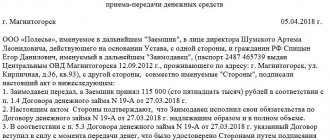An agreement of intent is necessary to determine the essence of future legal relations and establish certain conditions. Such a document usually states:
- what kind of deal will be concluded in the future;
- conditions that the parties must fulfill before concluding the main contract;
- How long will it take for the parties to conclude the main deal?
First of all, an agreement of intent is needed to pre-fix the terms of a future transaction, while retaining the opportunity to refuse to conclude it. For example, this is convenient if the seller is negotiating with several potential real estate buyers at once.
Also, a written letter of intent can serve as evidence that the parties actually negotiated the deal. In particular, it may be required when recovering damages if your partner suddenly and unjustifiably interrupted negotiations.
Finally, an agreement of intent can help out an entrepreneur if he has disagreements in the execution of an agreement that he concluded with a partner on its basis. Thus, when interpreting a contract, the court may also turn to the agreement of intent in order to establish the actual common will of the parties.
What it is
The contract is concluded if the parties came to an agreement when discussing essential conditions (clause 3 of article 154, clause 1 of article 432 of the Civil Code of the Russian Federation). Representatives of the supplier and customer jointly develop and agree on the terms. Another option is when one party comes to an agreement by accepting a request to conclude a contract from the other party (Clause 2 of Article 432 of the Civil Code of the Russian Federation).
It is sent in the form of a letter, fax, or draft contract. The contract is concluded only after the offeror receives full and unconditional consent (Articles 440, 441 of the Civil Code of the Russian Federation).
Answer
We believe that under a preliminary agreement, the seller can unilaterally extend the period for concluding the main agreement if a provision to this effect is contained in the preliminary agreement.
Extending the deadline unilaterally is a one-sided transaction. Unilateral transactions cannot create obligations for other persons, unless otherwise provided by law or in an agreement with these persons.
The obligation of the parties to the preliminary agreement is to conclude the main agreement. When the term for concluding the main agreement is extended, the parties become obligated to conclude the main agreement within the extended period.
The law does not provide that a party to a preliminary agreement can unilaterally extend the period for concluding the main agreement. Therefore, it is possible to perform this action only if the right to it is provided for in the preliminary agreement. Such a condition will comply with the principle of freedom of contract, according to which the parties independently determine the terms of the contract.
However, it should be borne in mind that in some cases such a condition may be challenged. For example, if the seller in the preliminary agreement is an entrepreneur, and the buyer is a consumer, then such a condition will be invalid, since it will infringe on the rights of the consumer in comparison with the rules established by laws or other legal acts of the Russian Federation in the field of consumer protection.
The Civil Code of the Russian Federation does not limit the period specified in the preliminary agreement for concluding the main agreement. If the period is not specified, then the main agreement must be concluded within a year.
Types of offers
There are several types:
- Free. Requests are sent to several potential customers in order to study the market.
- Public. It is sent to an indefinite number of people and includes all the essential terms of the contract. As a result, the conclusion of a public offer agreement occurs with the one who responds to the offer. The one who accepted it has the right to request that the offeror fulfill the agreement.
- Solid. The seller invites the only buyer to enter into an agreement and indicates the period for the entire period of which he is bound by obligations to sell goods, works, and services. If the buyer accepts the request from the supplier, the transaction is completed.
- Irrevocable. The offeror announces the terms of the agreement and concludes it with all interested parties. He has no right to withdraw the request.
Concluding an agreement: what to pay attention to?
Mikhail Zaplatnikov, a teacher and leading expert of the company, reviewed the main provisions of the Plenum of the Supreme Court of the Russian Federation, which concerns the issues of drafting various contracts. What types of contracts are there? How to correctly draw up and interpret a contract? You will find answers to these questions in our article.
On December 25, 2021, the Plenum of the Supreme Court of the Russian Federation issued Resolution No. 49 “On some issues of application of the general provisions of the Civil Code of the Russian Federation on the conclusion of a contract and the interpretation of a contract,” in which it considered the various stages of contractual work. The document provides explanations on the issues of concluding subscriber, framework, preliminary and public agreements, providing assurances about the circumstances, and formulates a position on the legal qualifications and interpretation of the agreement. Let us dwell on the most interesting provisions of this resolution.
Conclusion of an agreement
The Plenum of the Supreme Court of the Russian Federation, in its Resolution No. 49 dated December 25, 2018 (hereinafter referred to as the Resolution), once again recalled that an agreement is considered concluded if an agreement is reached between the parties on all essential terms. According to Article 432 of the Civil Code of the Russian Federation, the following conditions are essential:
- about the subject of the agreement;
- conditions that are named in the law or other legal acts as essential or necessary for contracts of this type;
- conditions regarding which, at the request of one of the parties, an agreement must be reached.
For example, during negotiations on concluding a contract for the provision of paid services, one of the parties proposed a condition on the price or stated the need to agree on it. In this case, this condition is essential to the contract. But we should not forget that if a party accepts full or partial performance under a contract or otherwise confirms its validity, then in the future it cannot refer in bad faith to its non-conclusion. Thus, the Plenum of the Supreme Court of the Russian Federation establishes the principle of estoppel.
If the form is not followed, but all essential conditions are agreed upon, then it cannot be said that the contract has not been concluded.
The Supreme Court of the Russian Federation clarified: Article 434.1 of the Civil Code of the Russian Federation can also be applied if the parties are negotiating the conclusion of a real contract. If, as a result of such negotiations, the contract is not concluded, the unscrupulous party will have to compensate for losses.
Public contract
A public contract limits the freedom of the parties to enter into the contract itself and determine its essential terms. How to determine whether a contract is public? The Civil Code of the Russian Federation contains signs of a public contract (Article 426 of the Civil Code of the Russian Federation) and a certain list of sample contracts. The Plenum of the Supreme Court of the Russian Federation noted (paragraph 3 of clause 15 of the Resolution) that public contracts do not include a loan agreement and a voluntary property insurance agreement, since these agreements depend on the characteristics of the consumer himself. For example, in a loan agreement such a characteristic is the borrower’s credit history and income, and in an insurance agreement it is the insurance risk.
The Supreme Court of the Russian Federation allowed the executor of a public contract to distribute consumers into certain categories, setting a separate price for goods for them, for example, based on a loyalty program for pensioners, students, large families, etc. Information about such categories must be available to consumers and posted on the contractor’s website (clause 17 of the Resolution).
Consumers under a public contract can be not only individuals, but also individual entrepreneurs and legal entities. An example of such an agreement is the conclusion of telephone services or sending correspondence by mail on behalf of the company.
The Civil Code of the Russian Federation (clause 3 of Article 426 of the Civil Code of the Russian Federation) does not allow refusal to conclude a public contract if the contractor has the opportunity to fulfill it. In this regard, the executor of the public contract must prove the inability to transfer goods, works and services.
Unilateral refusal by the executor of a public contract is not allowed, unless it is related to violations committed by the consumer, and the right to refusal is provided for by law. If the parties to a public contract are individual entrepreneurs, and the contract includes the right to unilateral refusal, then the party for whom the public contract was not binding may have such a right.
Preliminary agreement
A preliminary agreement, by virtue of Article 429 of the Civil Code of the Russian Federation, is concluded for the future transfer of property, performance of work or provision of services under the conditions provided for by such an agreement. On this issue, the Supreme Court of the Russian Federation explained that if at the time of concluding a preliminary or main contract it is impossible to transfer property, perform work or provide a service under a future contract, then this is not an obstacle to concluding a preliminary contract. The contract may be concluded in relation to a product, work or service that will be created or acquired by the seller in the future.
The Supreme Court of the Russian Federation gave a direct answer to the question of state registration of the preliminary agreement. If the main agreement, which will be concluded on the basis of a preliminary agreement, is subject to mandatory state registration, then the preliminary agreement itself is not registered (paragraph 2, paragraph 24 of the Resolution).
The preliminary agreement must describe the subject of the main agreement or the conditions that will allow it to be determined. It is not necessary to include any other essential terms of the main agreement. Any missing conditions can be additionally agreed upon by the parties when concluding the main contract, and if disagreements arise, in court.
Any preliminary agreement can be secured with a deposit, as well as a penalty for avoiding concluding the main agreement. Such a deposit, issued under a preliminary agreement, is credited to the price under the main agreement. If the deposit is made by a third party who is not obliged to pay under the main agreement, then it is subject to return, unless otherwise provided by the agreement.
In the operative part of the decision on compulsion to conclude the main contract, the court indicates from what moment it is considered concluded. This may be the date the court decision comes into force or another moment determined taking into account the terms of the agreement and the position of the parties. The court decision is the basis for state registration of such an agreement.
Framework agreement and subscription agreement
In the framework agreement, the parties determine the general conditions of the obligatory relationship (organizational, marketing, financial), which are subsequently clarified and specified by the parties by concluding separate agreements, filing applications, etc. The Plenum of the Supreme Court of the Russian Federation gave an example of what conditions the parties can stipulate in the framework agreement : general conditions for promoting purchased products on the market, bonuses for their distribution, penalties for violation of obligations.
If the parties in a separate agreement did not indicate a reference to the framework agreement, this in itself will not indicate the non-application of the terms of the framework agreement (clause 31 of the Resolution).
The subscription agreement provides for one of the parties to make certain payments or other provision for the right to demand from the other party the provision of the performance provided for in the agreement. The Plenum of the Supreme Court of the Russian Federation gives the following examples of subscription agreements: for the provision of communication services, legal services, and technical maintenance.
When concluding an agreement with execution on demand, you can limit the scope of execution by setting its upper limit.
An interesting point is where the Supreme Court of the Russian Federation explains that the provisions of Article 429.4 of the Civil Code of the Russian Federation do not apply if it is not clear whether the contract is a subscription agreement.
Representations about the circumstances
At the conclusion of the contract or after its conclusion, one party can assure the other about the circumstances that are relevant for the conclusion, performance or termination of the contract. Such representations may relate to or be unrelated to the subject matter of the contract. For example, a party can provide information about the availability of the necessary licenses and permits, regarding its financial condition, and about the absence of a conflict of interest with the manager. By providing such representations, the counterparty assumes responsibility for their accuracy.
The consequences of making false representations depend on whether they are related to the subject matter of the contract or not. If an unreliable representation relates to the subject of the contract, the provisions of Article 431.2 of the Civil Code of the Russian Federation and other general provisions on the contract and obligations apply. For example, the seller made false representations to the buyer about the quality characteristics of the product. In this case, the buyer can apply, along with the rules on the quality of the goods, the penalty agreed in the contract for providing statements that do not correspond to reality. But if the assurance does not relate to the subject of the contract, then liability will be determined in accordance with Article 431.2 of the Civil Code of the Russian Federation and Chapter 25 of the Civil Code of the Russian Federation.
The assurance may be provided by either the parties or a third party. If such a representation is unreliable, regardless of whether it is directly related to the subject of the contract, the third party is liable to the party to the contract to whom the representation was provided in accordance with Article 431.2 of the Civil Code of the Russian Federation and the provisions on liability for violation of obligations (Chapter 25 of the Civil Code of the Russian Federation) .
The person who provided the false assurance shall compensate for losses and (or) pay a penalty. Such liability will arise if this person assumed that the party to the contract would rely on him (Clause 1 of Article 431.2 of the Civil Code of the Russian Federation). At the same time, such a person, trying to avoid liability, cannot refer to the fact that the party to the contract was careless and did not itself reveal its unreliability.
Conclusion of a contract in court
The Supreme Court of the Russian Federation indicated that the requirement to compel the conclusion of an agreement can be satisfied if the defendant has an obligation to conclude such an agreement. The parties may submit to the court any disagreements that arise during the conclusion of the contract. If the defendant does not have an obligation to conclude an agreement or agreement to submit disagreements to the court, it cannot be refused to accept the statement of claim. In this case, the court considers the case on its merits and rejects the claim if, during the process, the parties did not agree to submit differences to the court for consideration (clause 38 of the Resolution).
Article 445 of the Civil Code of the Russian Federation establishes a thirty-day period for submitting a protocol of disagreements to the court. If such a deadline is missed, the court refuses to satisfy the claim only when the other party declares this (paragraph 1, paragraph 41 of the Resolution). Even if the established deadline is missed, the claim can be avoided if it can be proven that one party makes the provision and the other party accepts it.
If, based on the results of consideration of the claim, the court makes a decision obliging the court to conclude an agreement, then such an agreement is considered concluded from the moment the court decision comes into force. All terms of the contract are indicated in the operative part of the decision. No additional actions are required, including the signing of a separate bilateral document, or the exchange of offer and acceptance (clause 42 of Resolution 49).
Interpretation and legal qualification of the agreement
The need for interpretation arises when the parties have ambiguous or contradictory terms in the contract. The contract must be interpreted in a systematic relationship with the basic principles of civil law.
The Supreme Court of the Russian Federation indicated that priority is given to the interpretation that preserves the treaty.
It is unacceptable to interpret the terms of a contract in such a way that either party gains an advantage from its illegal or dishonest conduct.
If it is not possible to establish the common will of the parties, and the terms of the agreement are unclear, then the interpretation is carried out in favor of the party that prepared the draft agreement or proposed the wording of an unclear term.
The Supreme Court of the Russian Federation in its Resolution also drew attention to the legal qualification of the agreement. If the contract is mixed, then the rules on the relevant contracts are applied to the relations of the parties, unless otherwise follows from the agreement between the parties or from the essence of the mixed contract. If it is not possible to determine from the contents of the agreement which of the agreements provided for by law it relates to, then the rules on various agreements can be applied to the relations of the parties by analogy with the law.
For whom is this method convenient?
It is convenient for banks to submit a contract proposal. Credit institutions send simple instructions to potential clients for applying for a loan or servicing an account. Agreement with the terms is confirmed by the signing of documents and specific actions of the parties. As an example, activation of a credit card by an individual (appeal ruling of the Stavropol Regional Court in case No. 33-7366/2016 dated 09/06/2016). By activating the card, a person actually confirms his will.
Another case for application is when the parties do not need to prescribe special conditions or requirements for the execution of the agreement. In such situations, the agreement on the contract is confirmed by factual circumstances - the work performed and the long-term nature of the relationship between the parties to the transaction (resolution of the Arbitration Court of the North-Western District No. F07-225/2017 in case No. A21-3058/2016 dated 03/06/2017).
Through a request sent to an indefinite number of persons, an agreement on retail purchase and sale is concluded (Article 492 of the Civil Code of the Russian Federation). This is a public contract: the seller enters into it with each person who contacts him, based on the terms of the public offer (Article 426 of the Civil Code of the Russian Federation). Public in this case is the sale of goods in a specific place and at a specific price. Once the buyer pays for the goods, he accepts the offer to enter into a sales contract from the seller. The agreement between the parties is concluded upon issuance of a check or other payment document.
IMPORTANT!
Advertising, mailings and similar offers are not an offer, but an invitation to it, unless other conditions are specified within the letter (clause 1 of Article 437 of the Civil Code of the Russian Federation).
Analytics Publications
Often, the participants in the preliminary agreement, accepting obligations to conclude the main agreement, ensure their fulfillment with a deposit. At the same time, they provide that if the party that paid the deposit refuses to conclude the main contract, the latter remains with the other party, and if the party that received the deposit refuses to conclude the main contract, it must be returned to the counterparty in double amount. Is it permissible to secure obligations arising from a preliminary agreement with a deposit?
OPINIONS ARE DIVIDED
The Resolution of the Presidium of the Supreme Arbitration Court of the Russian Federation dated January 19, 2010 No. 13331/09 in case No. A40-59414/08-7-583 (hereinafter referred to as Resolution No. 13331/09) contains the conclusion that a deposit cannot be used as a way to secure the fulfillment of obligations by prior agreement. The opposite point of view is reflected in the Ruling of the Armed Forces of the Russian Federation dated July 22, 2008 No. 53-В08-5 (hereinafter referred to as Definition No. 53-В08-5), which states that securing a preliminary contract with a deposit is not prohibited by law.
In accordance with paragraph 1 of Art. 380 of the Civil Code of the Russian Federation, a deposit is recognized as a sum of money given by one of the contracting parties in payment of payments due from it under the contract to the other party, as proof of the conclusion of the contract and to ensure its execution.
Taking this into account, both in the theory of civil law and in judicial practice, three functions of the deposit are distinguished:
- security (the deposit ensures the fulfillment of obligations under the contract);
- evidentiary (the deposit is issued as proof of the conclusion of the contract);
- payment (a deposit is issued against payments due under the contract).
A preliminary agreement does not give rise to obligations among its participants to transfer property, pay money, perform work or provide services - they can only arise from the main agreement.
Therefore, the main argument in favor of the impossibility of securing obligations under a preliminary agreement with a deposit is traditionally the lack of a payment function. It was precisely these considerations that guided the Presidium of the Supreme Arbitration Court of the Russian Federation when issuing Resolution No. 13331/09, noting that, in accordance with paragraph 1 of Art. 380 of the Civil Code of the Russian Federation, a deposit can ensure the fulfillment by the parties of a monetary obligation under an agreement concluded between them, under which the party that transferred the deposit is or will be the debtor. Since the preliminary agreement does not give rise to a monetary obligation (its subject, as already indicated above, is the obligation to conclude the main agreement), a deposit under such an agreement cannot be issued.
However, in practice, payments under the preliminary agreement are still made. The purpose of making them is often to confirm the seriousness of the parties’ intentions to conclude a transaction, the solvency of the buyer of the property, to provide the owner of the alienated object with the funds necessary to prepare for the transaction, etc. As a rule, such payments are paid towards the price of the main contract, which must be concluded in the future.
PROBLEMS OF LEGAL QUALIFICATION
When a dispute arises about such payments, the courts are faced with the need for their legal qualification.
Arbitration courts, taking into account the legal position formulated in Resolution No. 13331/09, generally qualify such payments as an advance, including in the case when they are named in the contract as a deposit (determination of the Supreme Arbitration Court of the Russian Federation dated October 19, 2009 No. VAS-13238 /09 in case No. A32-25114/2008-48/354, dated 03/04/2011 No. VAS-1693/11 in case No. A76-34349/09-64-653, dated 03.29.2013 No. VAS-3157/13 in case No. А40-139849/10-60-903, resolution of the Federal Antimonopoly Service of the Ural District dated 08.18.2010 No. Ф09-5958/10-С6 in case No. А07-22967/2009, FAS Volga-Vyatka District dated 11.17.2011 in case No. А38- 281/2011, FAS of the Western Siabirsky District dated December 8, 2011 in case No. A70-5494/2011, FAS of the North Caucasus District dated June 22, 2012 in case No. A32-19421/2011, FAS of the Far Eastern District dated October 11, 2012 No. Ф03- 4486/2012 in case No. A73-668/2012, FAS Volga District dated 02.28.2013 in case No. A65-9973/2012, FAS Central District dated 09.13.2013 in case No. A23-2114/2012, FAS Moscow District dated 02.10. 2013 in case No. A41-2121/13, FAS North-Western District dated 03/03/2014 in case No. A56-27498/2013).
Often the formal reason for such qualification is clause 3 of Art. 380 of the Civil Code of the Russian Federation, according to which, in case of doubt as to whether the amount paid towards payments due from the party under the contract is a deposit, this amount is considered paid as an advance, unless otherwise proven.
Meanwhile, the advance, just like the deposit, has a payment function. The difference between them is that, unlike a deposit, an advance is not a way to ensure the fulfillment of obligations. And if the payment function, made in accordance with the terms of the preliminary agreement towards the price of the main contract, which will be concluded in the future, is recognized as a payment function, then problems with the possibility of recognizing such a payment as a deposit do not arise. This is precisely the approach that was applied by the RF Armed Forces when issuing Determination No. 53-B08-5.
In Determination No. 53-B08-5, the Supreme Court of the Russian Federation rejected the arguments of the defendant, who referred to the fact that the main agreement between the parties was not concluded, therefore there is no monetary obligation, i.e. the amount of money paid according to the preliminary agreement did not fulfill the payment function. Without denying that the subject of the preliminary agreement is only the obligation of the parties to conclude a main agreement in the future, the Supreme Court of the Russian Federation came to the conclusion that the fulfillment of this particular obligation was ensured by a deposit. Monetary was one of the buyer’s obligations under the main contract, against which, if concluded, the deposit amount paid by the buyer would be received. Thus, according to the Supreme Court of the Russian Federation, the funds paid by the buyer under the preliminary agreement in this situation performed a payment function, as a result of which they could be qualified as a deposit.
The Supreme Arbitration Court of the Russian Federation recognizes the practice of making payments under a preliminary agreement, suggesting that in such circumstances one should be guided by the following.
If the parties have concluded an agreement, named by them as preliminary, in accordance with which they undertake to conclude in the future, on the terms provided for in it, a main agreement for the sale of real estate that will be created or acquired in the future, but at the same time, the preliminary agreement establishes the obligation of the purchaser of the property before the conclusion the main agreement to pay the price of real estate or a significant part of it, then the courts must qualify it as a contract for the sale and purchase of future real estate with the condition of advance payment. This conclusion was formulated by the Supreme Arbitration Court of the Russian Federation in paragraph 8 of the Resolution of the Plenum of the Supreme Arbitration Court of the Russian Federation dated July 11, 2011 No. 54 “On some issues of resolving disputes arising from contracts regarding real estate that will be created or acquired in the future.” Disputes arising from the said agreement are subject to resolution in accordance with the rules of the Civil Code of the Russian Federation on the purchase and sale agreement.
However, this approach does not allow us to fully solve the problem associated with making payments under a preliminary agreement, because:
- it is not applicable in a situation in which a preliminary agreement is concluded in relation to an object that, at the time of its conclusion, is already owned by the seller;
- it does not allow reclassification of the preliminary agreement into the main one in cases where, according to the preliminary agreement, an insignificant part of the price of the main agreement is paid;
- unjustified requalification of the contract concluded by the parties in any case infringes on the freedom of contract, which has been elevated to the rank of a principle of civil legislation (clause 1 of article 1 of the Civil Code of the Russian Federation).
When an offer is required
For some offerors and acceptors, the conclusion of a contract upon a received request is mandatory (Article 445 of the Civil Code of the Russian Federation).
If the obligation is established for the acceptor (Part 1 of Article 445 of the Civil Code of the Russian Federation):
- The party sends the offeror an acceptance, refusal or protocol of disagreement within a thirty-day period from the date of receipt of the letter.
- If the offeror does not accept the protocol of disagreements, he has the right to submit it to the court for consideration within 30 days from the date of its receipt or the end of the acceptance period.
If the obligation to conclude a contract is established for the offeror (Part 2 of Article 445 of the Civil Code of the Russian Federation):
- The offeror receives a protocol of disagreements from the acceptor and within 30 days from that moment rejects it or enters into an agreement on new terms.
- The acceptor has the right to send disagreements to the court if he does not receive a response to the request or if the rejected protocol of disagreements is returned.
If the party for whom the conclusion of the agreement is mandatory evades this action, the other party has the right to force the signing of the contract through the court (Part 4 of Article 445 of the Civil Code of the Russian Federation).
Preliminary agreement
The main purpose of such a document is to precede a contract, which the parties will later draw up and conclude. It will more specifically stipulate mutual rights and obligations. In the meantime, the partners have come to a fundamental agreement - a deal is needed - and also discussed its basic conditions. For example, the subject of a transaction.
As a rule, a preliminary agreement is concluded in two cases:
- both parties are interested in the transaction, but any data necessary to draw up an agreement is missing. For example, there are no exact prices yet, and it is currently impossible to conclude a main contract. At the same time, there is a real possibility that if there is delay, the counterparty will enter into a deal with another company. An example would be the sale of a scarce product;
- the transaction requires state registration. Perhaps the most common situation is the sale of residential premises. In this case, one of the parties transfers the advance (deposit) to the other before concluding the main contract.
Compiling a document
The preliminary agreement must meet a number of requirements. All essential terms of the contract provided for a certain category of transactions, and especially information about the subject of the future contract, must be contained in the preliminary agreement (clause 3 of Article 429 of the Civil Code of the Russian Federation). In practice, the absence of such conditions in the preliminary agreement is the most common mistake.
The fact is that the conclusion of a preliminary agreement is often resorted to at a stage when it is still impossible to clearly define the conditions that are considered essential by law (Article 432 of the Civil Code of the Russian Federation). For example, when concluding a preliminary construction contract, the parties often do not indicate the specific types of work that are planned to be performed. This violation (the subject of the agreement is not established) may lead to the recognition of the preliminary agreement as not concluded (clause 1 of Article 432 of the Civil Code of the Russian Federation). Naturally, no rights or obligations arise from such a document.
At the same time, the deadline for concluding the main transaction is not a mandatory condition of the preliminary agreement. Of course, it is better to foresee it. But if the parties for any reason ignored it, the rule of paragraph 4 of Article 429 of the Civil Code will apply. That is, the contract must be concluded within a year from the date of drawing up the preliminary agreement.
The form of concluding a preliminary agreement deserves special attention. According to paragraph 2 of Article 429 of the Civil Code of the Russian Federation, an agreement of intent should be concluded in the same form as provided by law for the main transaction. That is, if all contracts involving legal entities must be drawn up on paper, then a preliminary agreement in oral form is unacceptable. Failure to comply with the rules on the form of the preliminary agreement entails its nullity (clause 2 of Article 429 of the Civil Code of the Russian Federation).
Let's lay out the "straws"
As mentioned above, the term for concluding the main agreement may be directly indicated in the letter of intent. Otherwise, it should be concluded within a year. If the main agreement is not concluded within this period, the obligations under the preliminary agreement are terminated. Thus, a situation that seems paradoxical at first glance arises. Namely: before the expiration of the period specified in the agreement of intent, the grounds for going to court had not yet arisen, and after that they had already disappeared.
To avoid this trouble, the following conditions must be met. A company interested in a transaction can send a proposal to the future partner to conclude the main agreement. This document is drawn up in free form. It is an ordinary letter.
The proposal must be accompanied by a draft contract. Its terms must be similar to the terms of the preliminary agreement. Naturally, the project is drawn up in an expanded version. In other words: before the expiration of the period specified in the preliminary agreement, the company may offer the counterparty to conclude the main contract. The project is also being sent so that it can be taken to court in the future.
For its part, the counterparty, having received such a letter, must sign the proposed version of the contract. He can also present and send reasoned objections to the other party (protocol of disagreements). Read more about this document in the article “A binding contract can be challenged” (PB No. 6, 2006).
If the counterparty signs the draft agreement, then the main agreement is considered concluded.
Themis will help
If the counterparty has not sent either a signed project or a protocol of disagreements, the company should go to court. Moreover, paragraph 5 of Article 429 of the Civil Code provides for such a possibility. The conclusion of a preliminary agreement automatically makes the completion of the main transaction mandatory for both parties. And if the counterparty does not sign the main agreement, the rules of paragraph 4 of Article 445 of the Civil Code of the Russian Federation apply. That is, the company gets the right to force him to conclude a deal through the court.
At the same time, she may demand compensation for losses caused to her by avoiding signing the contract, such as compensation for payment for the services of a representative, excess price under a similar contract that had to be concluded with third parties, etc.
Tatyana Voloshina, lawyer:
“It is not possible to conclude a preliminary agreement in all cases. So, for example, it is impossible to conclude a compensation agreement on the terms of a preliminary agreement (see the decision of the Federal Arbitration Court of the Moscow District dated April 13, 2006 in case No. KG-A40/2637-06).”
L. Salnikova, lawyer
PRACTICAL ENCYCLOPEDIA OF AN ACCOUNTANT
Complete information about accounting rules and taxes for an accountant. Only a specific algorithm of actions, practical examples and expert advice. Nothing extra. Always up-to-date information.
Connect berator
How to prepare
A written contract proposal is similar to a commercial proposal. The supplier sends the terms of delivery to the potential customer. The difference is that after signing the document, it has legal force and the parties automatically enter into an agreement.
Here's how to make a firm offer:
- Specify to whom the letter is sent - name of the organization, full name. representative
- Title the document.
- Provide reliable information about the product: name, quantity, price.
- List the ways to conclude an agreement.
- Determine the procedure for mutual settlements.
- Enter the supplier's details for transferring funds.
- Assign responsibility for violations of contractual terms.
There is no unified form. The seller develops and completes the document based on commercial needs.
Example of use on "Secret"
“Polish 3D printer manufacturer Zortrax announced in early 2014 that it had signed a contract to supply 5,000 M200 3D printers to American giant Dell. After this, many world media wrote about the then small company, Polish additive technologies began to be considered high-quality, and investors began to massively finance the country’s startups, including Zortrax itself. Subsequently, it turned out that the deal was only an agreement of intent and did not reach completion, and all the success turned out to be a myth.”
(From the news of how 3D printer maker Zortrax's biggest deal turned out to be a scam.)







